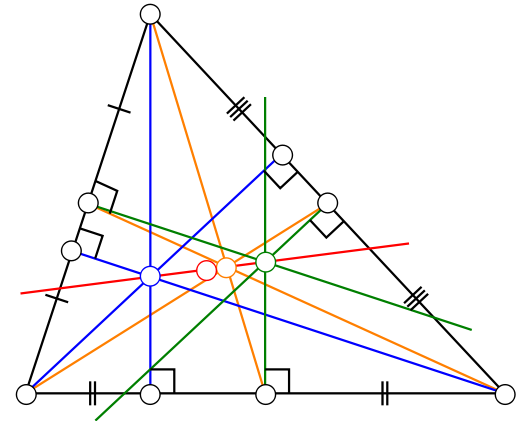从塞理斯首创宇宙的物质本源学说到亚里斯多德建立起庞大的自然哲学体系,在科学的主要方面,以现代物理学作为考量,古希腊没有留下什么不可忽略的科学成果,这儿说的是科学理论体系以及科学新发现(阿基米德的静力学可能有些例外),那么古希腊有科学吗?如果有,是什么?
劳埃德先生在《早期希腊科学》一书中对上述时期内的古希腊科学成果的总结时强调了两点:(i)数学在理解自然中的运用;(ii)进行经验研究的主张。劳埃德先生总结的两点是拿现代科学,尤其是20世纪的物理学革命给人印象最深的方面作为参照了。劳埃德先生本人是哲学家和古希腊史专家,不是科学家,因此得不出这方面的准确判断。
我们要听历史上最伟大的物理学家爱因斯坦的判断:At the age of 12,I experienced a second wonder of a totally different nature:in a little book dealing with Euclidean plane geometry, which came into my hands at the beginning of a schoolyear.Here were assertions, as for example the intersection of the three altitudes of a triangle in one point, which —though by no means evident—could nevertheless be proved with such certainty that any doubt appeared to be out of the question.

垂心(蓝),形心(黄),外心(绿)能连成欧拉线。
This lucidity and certainty made an indescribable impression upon me.That the axioms had to be accepted unproved did not disturb me.In any case it was quite sufficient for me if I could peg proofs upon propositions the validity of which did not seem to me to be dubious.
震撼了十二岁的小阿尔伯特的童心的正是古希腊科学的代表作,人类历史上的第一个科学体系的奇迹——古希腊的演绎推理证明逻辑体系。所以,古希腊科学的主要成就被科学方法专家归结为“证明式科学”,当然这里的科学应理解为最广义的,可以等同于柏拉图所定义的“知识”。
当然,古希腊证明式科学Demonstrative Science是很简明的:Greek Proof:Logical deduction from explicitly stated definitions and logical deduction from a small number of explicitly stated self-evident assumptions called axioms and postulates.
希腊的逻辑完全是演绎的,这就发生了关于最初的前提的问题。最初的前提必须是,至少部分地必须是普遍的;而且又没有方法可以证明它们。这方面的问题直到文艺复兴以后才解决。


